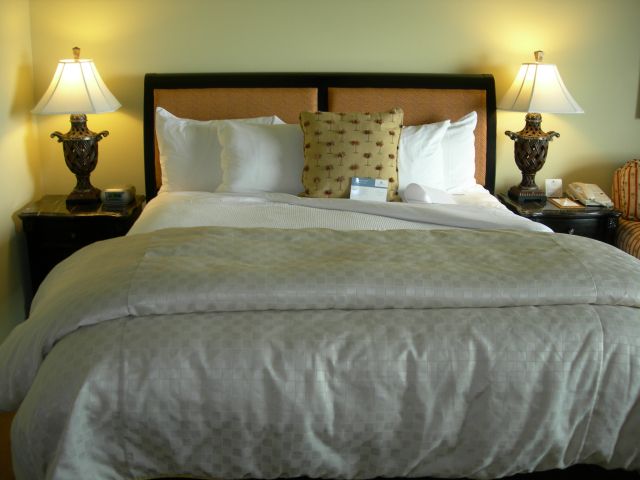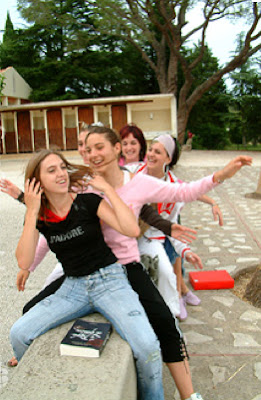Français 1-Unité 6, «L'école» pp. 32-34
GRAMMAIRE
LES VERBES RÉFLÉCHIS
GRAMMAIRE
LES VERBES RÉFLÉCHIS
 |
| Tous les matins avant l'école, la belle Eugénie s'arrange devant le miroir: elle s'habille; elle se maquille; elle se coiffe. |
Getting up, washing, and getting dressed are activites that we do every day. In French, these activities are expressed by REFLEXIVE verbs.
Note the form of French reflective verbs in the sentences below :
Je me lève à sept heures. I get up at seven .
Tu te laves dans la salle de bains
You wash up in the bathroom.
You wash up in the bathroom.
Nous nous habillons. We are getting dressed.
Note the forms of the reflexive verbs se laver (to wash up) and s’habiller (to get dressed). This is a very complete table :
You can also form a negative question. Just take the negative, put the « Est-ce que » in front and presto ! We’ll use the formal « vous » for the following examples :
· Positive statement :
Vous vous lavez . You are washing up
· Negative statement :
Vous ne vous lavez pas. You aren’t washing up
· Positive question:
Est-ce que vous vous lavez ? Are you washing up ?
· Negative question:
Est-ce que vous ne vous lavez pas ? Aren’t you washing up ?
Vous vous lavez . You are washing up
· Negative statement :
Vous ne vous lavez pas. You aren’t washing up
· Positive question:
Est-ce que vous vous lavez ? Are you washing up ?
· Negative question:
Est-ce que vous ne vous lavez pas ? Aren’t you washing up ?
Reflexive pronouns represent the same person as the SUBJECT :
Eric se lave. Eric is washing (himself).
Nous nous habillons. We are getting (ourselves) dressed.
Je me déshabille. I am getting (myself) undressed.
Nanette ne se couche pas Nanette is not getting herself to bed.
The last example shows that the reflexive form also exists in English – when you get yourself to do something : She is getting herself to sleep. In French, these reflective verbs are so common that they are listed as separate entries in the dictionary-- se coucher is under "C".·
Reflexive pronouns come immediately BEFORE the verb
Reflexive pronouns come immediately BEFORE the verb
- Note that me, te, and se become m’. t’ and s’ before a vowel.
- Note that the « h » is silent in « s’habiller » : that is why it starts with s’ !
COMPARE THESE TWO PICTURES :
Il lave son enfant.
· In the first picture, the elephant is performing an action for someone else (another elephant).
· He is washing his child.
Il se lave.
· In the second picture, the elephant is performing an action on himself.
· He is washing himself.
· In the second sentence, the object pronoun se represents the same person as the subject (l’éléphant).
· This is called a REFLEXIVE PRONOUN because the action is reflected back on the subject.
VOCABULAIRE
COMMON REFLECTIVE VERBS
COMMON REFLECTIVE VERBS
Here is a list of some of the most common reflective verbs. The asterix (*) shows an irregularity in the verb ; that is, if any. Otherwise, conjugate the verbs as you’d normally conjugate any regular verb that ends in –er, -ir, or –re… just don’t forget to put the reflexive pronoun before the verb !
*****
***
*****
*******
*****
*****
EXERCISE 1 (p. 33) Les verbes réfléchis :
1. Nous………………………..(s’amuser) beaucoup le weekend.
2. Il………………………..(se lever) en retard tous les matins !
3. Je…………...…………..(se coucher) à neuf heures et demie.
4. Vous…………...………..(s’ennuyer) à l’école ?
5. On……………………..(s’éclater) quand on fait du basket,
Est-ce qu'on……………….……………………..(se réveiller) à
huit heures ou à huit heures et demie ?
Est-ce qu'on……………….……………………..(se réveiller) à
huit heures ou à huit heures et demie ?
1b (Supplementary, not in the original book) Here’s the same chart we saw earlier, but with th e informal « tu» form of the verb s’habiller :
· Positive statement :
Tu t’habilles. You are getting dressed
· Negative statement :
Tu ne t’ habilles pas. You aren’t getting dressed
Tu ne t’ habilles pas. You aren’t getting dressed
· Positive question:
Est-ce que tu t’habilles? Are you getting dressed?
Est-ce que tu t’habilles? Are you getting dressed?
· Negative question:
Est-ce que tu ne t’ habilles pas? Aren’t you getting dressed?
Est-ce que tu ne t’ habilles pas? Aren’t you getting dressed?
1. Use the third person « on» form with the verb se déshabiller (to get undressed – conjugate exactly like s’habiller. Remember that «on » can also mean « we » ! I’ll do the first one for you
· Positive statement
……On se déshabille... We are getting undressed
……On se déshabille... We are getting undressed
· Negative statement :
…………………………… We aren’t getting undressed
…………………………… We aren’t getting undressed
· Positive question:
………………………… ? Are we getting undressed?
………………………… ? Are we getting undressed?
· Negative question:
…………………………. ? Aren’t we getting undressed?
…………………………. ? Aren’t we getting undressed?
 |
| SE COUCHER |
2. Try this! Use the informal « tu» form with the verb se coucher (to go to bed) :
· Positive statement :
…………………………… You are going to bed.
· Negative statement :
………………………………… You aren’t going to bed.
………………………………… You aren’t going to bed.
· Positive question:
………….......……………….. ? Are you going to bed ?
………….......……………….. ? Are you going to bed ?
· Negative question:
………………………....……. ? Aren’t you going to bed?
………………………....……. ? Aren’t you going to bed?
3. One more! Try the third person this time with the verb se coucher (to go to bed). We’ll use a real person instead of a pronoun. I’ll do the first one for you :
· Positive statement
…....Nanette se couche........ Nanette is getting herself to bed.
…....Nanette se couche........ Nanette is getting herself to bed.
· Negative statement :
………………………….. Nanette isn’t getting herself to bed.
………………………….. Nanette isn’t getting herself to bed.
· Positive question:
…………………………… ? Is Nanette getting herself to bed ?
…………………………… ? Is Nanette getting herself to bed ?
· Negative question:
……………….….……. ? Isn’t Nanette getting herself to bed?
……………….….……. ? Isn’t Nanette getting herself to bed?
EXERCISE 2 (p.33) Après le match de basket
Des copains ont joué au basket. Après le match, ils se lavent.
Stéphanie Stéphanie se lave.
1. Patrick……………………..…………...………….
2. Nathalie…………………………………………..
3. Éric et Olivier………..………………...…………..
4. Corinne……………………………………..……..
5. Nous…..……………………………......…………..
6. Vous…..…….……………………………......……..
7. moi……..……………………………………….…..
8. toi……..………………………………………...…..
9. Isabelle……………………………………………..
2. Nathalie…………………………………………..
3. Éric et Olivier………..………………...…………..
4. Corinne……………………………………..……..
5. Nous…..……………………………......…………..
6. Vous…..…….……………………………......……..
7. moi……..……………………………………….…..
8. toi……..………………………………………...…..
9. Isabelle……………………………………………..
EXERCISE 3 (p.34) Qu’est-ce qu’ils font ?
Complétez les phrases avec le pronom réfléchi qui convient. Attention aux verbes qui commence avec le son d’une voyelle !
è Thomas se lève à huit heures.
è Armand s’ éclate quand il fait de la danse.
è Armand s’ éclate quand il fait de la danse.
1. Les élèves ………….habillent pour aller à l’école.
2. Vous …………..…lavez après le match de foot.
3. Nous ………….…promenons à la campagne.
4. Le dimanche, mes parents ……………reposent.
5. Je ………..habille bien pour aller au restaurant.
6. À quelle heure est-ce que Brigitte ………..lève ?
7. À quelle heure est-ce que tu ………couches ?
8. Le lundi, je ………..réveille à sept heures moins le quart.
EXERCISE 4 (p.34) Après le dîner
Dites si oui ou non les personnes suivantes se reposent après le dîner.
Nous étudions
…………Nous ne nous reposons pas ………….
1. Madame Boulot travaille.
………………..……….………………………….
………………..……….………………………….
2. Tu fais la vaisselle.
……………………….………………………….
……………………….………………………….
3. Je regarde la télé.
…………………………………...…………….
…………………………………...…………….
4. Monsieur Canard lit le journal.
…………………….………………………….
…………………….………………………….
5. Les élèves préparent l’examen.
…………………………….………………………….
…………………………….………………………….
6. Nous regardons la télé.
…………………………….………………………….
…………………………….………………………….
7. Vous dormez.
………………………….………………………….
………………………….………………………….
8. Sophie écoute ses compacts.
………………………….………………………….
Je fais mes devoirs.
………………………........………………………….
Mes copains vont au stade.
……………………………….………………………….
………………………….………………………….
Je fais mes devoirs.
………………………........………………………….
Mes copains vont au stade.
……………………………….………………………….
EXERCISE 4 (p.34) Expression personelle
Complétez les phrases suivantes en utilisant les suggestions entre parenthèses.
Exemple:
En général, je me réveille. (comment ?)
…Je me réveille avec une horloge à coucou
1. En général, je me réveille. (à quelle heure ?).
……………..………………………….………………………….
……………..………………………….………………………….
2. Le dimanche, je me lève. (à quelle heure ?).
……………………………………….………………………….
……………………………………….………………………….
3. Je me lave. (avant ou après le petit déjeuner ?).
…………………………………….………………………….
…………………………………….………………………….
4. Je m’habille (dans ma chambre ou dans la salle de bains ?).
……………………………………….………………………….
……………………………………….………………………….
5. Le weekend, je me promène souvent. (en ville ou à la campagne ?).
…………………………………..….………………………….
…………………………………..….………………………….
6. En général, je me repose. (avant ou après le dîner ?).
…………………………………..…….………………………….
…………………………………..…….………………………….
7. En général, je me couche (à quelle heure ?).
…………………………………..…….………………………… .
…………………………………..…….………………………… .
EXERCISE 6 (p.34) Équivalences
Lisez ce que font les personnes suivantes. Décrivez leurs activités en utilisant un verbe réfléchie équivalente à l’expression soulignée.
è Janette va au lit à minuit. Janette se couche à minuit.
1. Catherine met une belle robe.
………..………………………………………………………
………..………………………………………………………
2. Nous faisons une promenade à la campagne.
………………………………………………………………
………………………………………………………………
3. Le dimanche, ma mère ne travaille pas.
………………………………………………………………
………………………………………………………………
4. Philippe ouvre (opens) les yeux.
………………………………………………………………
………………………………………………………………
5. Mes copains font une promenade en ville
…………………………………..……………………………
…………………………………..……………………………
6. Je sors du lit à six heures et demie
…………………………………..……………………………
…………………………………..……………………………
7. Tu prends un bain (bath).
…………………………………..……………………………
…………………………………..……………………………
8. Vous allez au lit.
…………………………………..……………………………
…………………………………..……………………………
9. Tu mets tes vêtements.
…………………………………..……………………………
…………………………………..……………………………
7. CONVERSATION
Avec vos camarades, discutez de ce que vous faites en différents circonstances :
À quelle heure ?
|
Avec qui?
|
Où ?
|
Comment?
|
se réveiller
se coucher
|
s’éclater
s’amuser
|
se promener
se reposer
|
s’habiller
se reposer
|
le lundi ?
|
pendant la semaine ?
|
le weekend ?
|
quand tu vas à l’école ?
|
le dimanche ?
|
le samedi soir ?
|
avec ta famille ?
|
quand tu vas à la plage ?
|
pendant les vacances ?
|
pendant les vacances ?
|
avec tes copains ?
|
quand tu vas à une boum ?
|
quand il fait froid?
|
*******
Cliquez
~ Français 1-Unité 6, «L'école» pp. 32-34 ~

































No comments:
Post a Comment